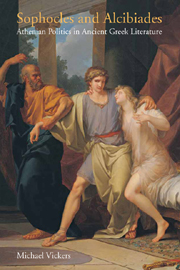Book contents
- Frontmatter
- Contents
- Preface
- 1 The mythologizing of history
- 2 Antigone, Pericles and Alcibiades
- 3 Oedipus Tyrannus, Alcibiades, Cleon and Aspasia
- 4 Ajax, Alcibiades and Andocides
- 5 Philoctetes, Alcibiades, Andocides and Pericles
- 6 Alcibiades in exile: Euripides' Cyclops
- 7 Oedipus at Colonus, Alcibiades and Critias
- 8 Critias and Alcibiades: Euripides' Bacchae
- 9 Alcibiades and Melos: Thucydides 5.84–116
- 10 Thucydides on tyrannicides: not a “digression”
- 11 Alcibiades and Persia (and more Thucydidean “digressions”)
- 12 Alcibiades and Critias in the Gorgias: Plato's “fine satire”
- Epilogue
- Bibliography
- Index locorum
- Index
12 - Alcibiades and Critias in the Gorgias: Plato's “fine satire”
- Frontmatter
- Contents
- Preface
- 1 The mythologizing of history
- 2 Antigone, Pericles and Alcibiades
- 3 Oedipus Tyrannus, Alcibiades, Cleon and Aspasia
- 4 Ajax, Alcibiades and Andocides
- 5 Philoctetes, Alcibiades, Andocides and Pericles
- 6 Alcibiades in exile: Euripides' Cyclops
- 7 Oedipus at Colonus, Alcibiades and Critias
- 8 Critias and Alcibiades: Euripides' Bacchae
- 9 Alcibiades and Melos: Thucydides 5.84–116
- 10 Thucydides on tyrannicides: not a “digression”
- 11 Alcibiades and Persia (and more Thucydidean “digressions”)
- 12 Alcibiades and Critias in the Gorgias: Plato's “fine satire”
- Epilogue
- Bibliography
- Index locorum
- Index
Summary
The dominant personality in Plato's Gorgias is Callicles, the man who argues forcefully that “might is right”. It is also widely believed that the issues involved have been exhaustively analysed by Dodds in his edition and commentary on the Gorgias, and that little more need be said. There remains, however, much disagreement as to quite who Callicles is, or whom he represents. Callicles is so carefully delineated that it is difficult to believe that he is wholly fictitious (and if he were, he would be the only such example in the whole of Plato). He is said to come from the deme of Acharnae (495d), and to be the erastes of the known individual Demus (481d). The names of his acquaintances (487c) suggest that he belongs to the Athenian aristocracy, the younger members of which came under the influence of the sophists in the 420s. And yet there are problems. Unusually, his patronymic is not given, and perhaps surprisingly for such a forthright individual, Callicles is not heard of in Athenian politics outside the Gorgias.
It has been suggested that Callicles died young, “before he had time to make his mark on history”. Many have been tempted to see Callicles as a mask for some historical individual, but some suggestions are less likely than others. Alcibiades would appear at first sight to have a strong case, but there is an apparently insuperable obstacle in that Plato draws a careful distinction between him and Callicles (481c–d).
- Type
- Chapter
- Information
- Sophocles and AlcibiadesAthenian Politics in Ancient Greek Literature, pp. 153 - 176Publisher: Acumen PublishingPrint publication year: 2008



